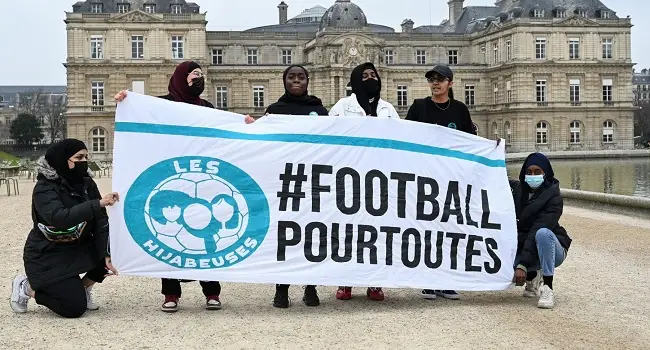France’s top administrative court on Thursday upheld a ban on women football players wearing Islamic hijab headscarves, after the issue was seized on by politicians claiming secularism was at risk.
“Sporting federations whose task is to ensure the good functioning of public services… can impose a neutrality requirement on their players in competitions and sporting events, to guarantee the smooth running of matches and any clashes or confrontation,” the Constitutional Council said in a statement.
It found a French Football Federation (FFF) rule against “any sign or clothing clearly showing political, philosophical, religious or union affiliation” during play to be “appropriate and proportionate”.
A group of Muslim women footballers called the “Hijabeuses” had launched the action against the FFF regulation.
Judges found themselves under political pressure ahead of the ruling as mainstream parties look to fend off the far right riding high in the polls.
Secularism is a sensitive topic in France, presented by its defenders as a way of guaranteeing the state’s religious neutrality and by critics as a dog-whistle against ethnic and religious minorities, especially Muslims.
A Monday boost for the “Hijabeuses”, when the state’s legal advisor concluded the rule was unjustified, prompted a wave of political condemnation.
Interior Minister Gerald Darmanin, a law-and-order hardliner, said Tuesday, “I hope profoundly for the republic that (judges) uphold neutrality on sports fields.”
The “Hijabeuses” were hoping to give the republic a “battering”, Darmanin added.
“You shouldn’t wear religious clothing when you play sports… when you play football, you don’t need to know the religion of the person in front of you,” he said.
Other voices from the conservative Republicans party and far-right National Rally have also chimed in.
Far-right leader Marine Le Pen wrote on Twitter: “No to the hijab in sport. And we will pass a law to make sure it is respected.”
Republicans chief Eric Ciotti said his party — which holds just 62 seats in France’s 577-seat parliament — would introduce a bill on the topic if the court allowed the hijab.
Sports Minister Amelie Oudea-Castera has also suggested Macron’s government could legislate, saying “we aren’t ruling anything out” and “we can see that there’s a need for clarification”.
The Constitutional Council itself shot back Wednesday at what it said were “attacks aimed at the administrative branch and especially the legal advisor”.
Questioning the workings of the courts was “an attack on an institution that is essential for democracy,” the body added, saying it could take legal action in cases of “insult, defamation, incitement to hatred or threats”.




































